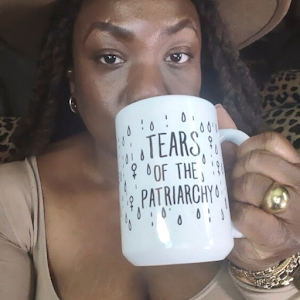Note: another version of this post is published on All Digitogracy.
Amid chatter about the time limit imposed on her fame following an Oscar win for 12 Years a Slave, and whether or not her allure amounts to nothing more than fetishistic curiosity for an enthralled white media machine, actress Lupita Nyong’o has proved that she’s here to stay and that she’s more than just an impeccably dressed red carpet darling and non-normative 'It girl.' When the buzz surrounding Lupita’s award-winning breakout role waned a bit, skeptical culture pundits wondered whether or not Lupita had the chops to offshoot with a varied film career, following her memorable portrayal of a slave named Patsey.
Though 12 Years a Slave was still fresh off the film festival express, press junkets, and award show circuit, people eagerly wanted to know, “What now?” – wondering if Lupita would fall prey to the Oscar curse that seems to befall black actresses, after they've received award recognition by the Academy. While people waited to see if her career would be able to keep up its upward momentum, Lupita’s presence continued to be a breath of fresh air for many others, weary of the beauty hierarchy that often discounts monoracial black women who don't fit beauty norms. After her Oscar win, Lupita seemed to silence skeptics by continuing to stay on mainstream media’s radar via a series of magazine editorials and fashion 'hit' lists.
After much speculation, it was later confirmed that the actress had snagged a role in Star Wars VII (J.J. Abrams was, reportedly, initially looking to cast a mixed-raced actress) and that she is slated to adapt Nigerian writer Chimamanda Ngozi Adichie’s acclaimed novel Americanah, into a film, in which she’ll serve as star and producer (in collaboration with Brad Pitt’s production company Plan B). One would think that would be enough to silence Lupita cynics who don't often see it for dark-skinned black actresses... even when they're model-pretty, however, she knocked it out of the ballpark garnering the cover of People magazine’s annual '50 Most Beautiful People' 2014 issue, the cover of the July 2014 issue of Vogue, and an exclusive contract as the new face of Lancôme (making her the second black woman to serve as the cosmetic company’s brand "ambassadress").
Impressive feats and a great year for the Mexican-born Kenyan actress so far; particularly since visibly black women like Lupita, who navigate different intersections – race, colorism, gender, and class –, are overlooked as likely choices for those opportunities and held to rigid Eurocentric beauty ideals which dictate that mixed-raced or racially ambiguous blackness is the aesthetic they should adhere to if they expect to appeal to the masses.
And Lupita has admitted that she didn't always feel beautiful in her skin, during a poignant acceptance speech at an Essence awards luncheon earlier this year; and she's emphatic about wanting to serve as an inspiration to other young black girls who don’t often see representations of themselves on TV or in magazines.
Black folks may (understandably) scoff at any suggestion that black beauty needs to be filtered through the white gaze and validated by white authority. Breaking News: It doesn't. But it’s important to keep in mind that media images and characters that are inclusive matter to young black girls who're coming-of-age, being fed a steady diet of respectability politics, shadeism, racio-misogyny, and shady product endorsements that dissuade them from being proud of who they are, to such an extent that they feel the need to physically alter themselves to fit in. Also, distorted views on black beauty are often perpetuated intra-racially, driven by cultural imperialism – it’s important not to lose perspective of what breeds self-hate.

Needless to say, Lupita Nyong’o is thriving in a mercurial business that has, so far, embraced her, and it’s been refreshing to see the rise of a woman of her look and stature. It's also been great seeing Lupita use her platform to challenge narrow ideas of what's deemed acceptably beautiful. However, Lupita isn't the only black actress raising awareness and her popularity doesn't mean that there’s been some huge and sudden shift in the dominant view of dark-skinned black and brown women in the industry. Lupita’s growing fame still isn't the criterion for monoracial black actresses; particularly those who are American-born. Lupita’s blackness is ‘international' and in mainstream media-speak, ‘international’ is coded language for ‘exotic other.’ Lupita Nyong’o presents the type of interesting background, visual, and personality that easily endear her to the cult of personality. And the entertainment industry certainly loves to eat up stories about ‘other’ anything or anyone anomalous they can commodify and that will feed their affinity for pointing out others' differences.
The media's giddy fascination with othering non-American born black women in the entertainment industry, is what provoked handlers for figure-skater Surya Bonaly to fabricate a story about her origins, and what caused fashion photographer Peter Beard to sell some convoluted story about his discovery of Somali supermodel Iman, to the fashion world-- a story that she admittedly helped perpetuate. For most black American women in the public eye (and in general), being ‘just black’ or not deemed a special enough snowflake, apparently isn't sufficient enough to garner visibility, opportunities, or respect. But American women who are visibly black are definitely interesting enough to vulturize before being totally erased from the equation.
I’m still loath to call Lupita a ‘fetish,’ because she is better than that write-off. She's immensely talented, deserving of all the wonderful things, and beautiful… period. And her image is needed in the fray. But when it comes to who is chosen to grace magazine covers and become black leading ladies or romantic love interests, the system requires more dismantling, especially since there are a number of equally as talented black seasoned actresses who have been in the business for years, but still come up against a dearth of plum roles, because casting directors and producers often offer them to bankable (read: palatable) biracial or multiracial actresses – even in biopics where the subject is fully black; and industry folks will shamelessly costume a multiracial actress in blackface and prosthetic makeup to force it to work.
Lupita has become a glamorous media favorite, style trendsetter, and is helping influence the way the world looks at dark-skinned black women but, her 'international' allure notwithstanding; this still doesn't insulate her from having to navigate the politics of an industry and media prone to typecasting and pigeonholing actresses and women who share her complexion. She’s definitely carved out a niche for herself, but Lupita’s success doesn't mark the end to the way mass media views black women who don’t often get the red carpet rolled out for them with such fanfare.










No comments
Post a Comment